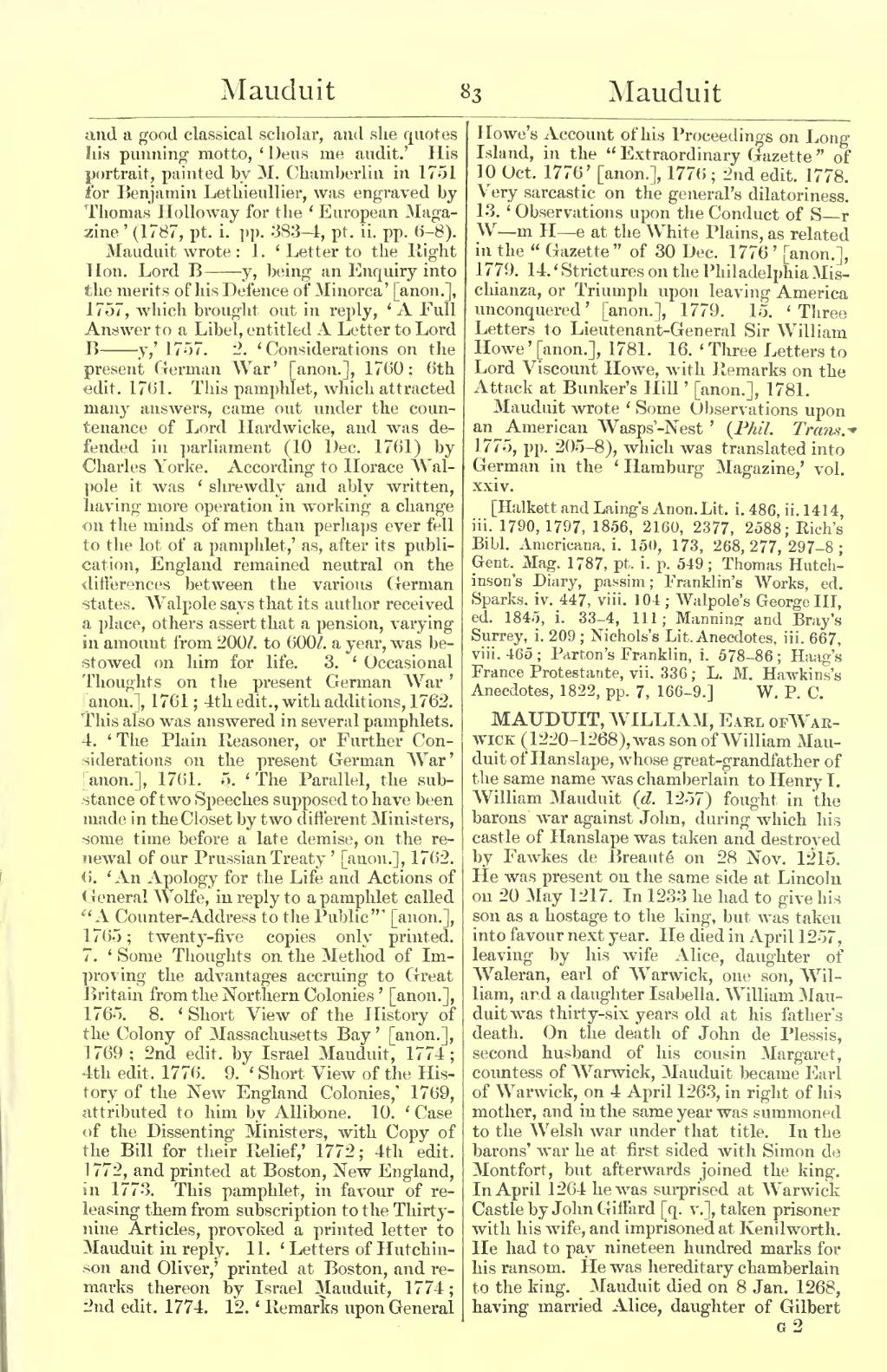and a good classical scholar, and she quotes his punning motto, ‘Deus me audit.’ His portrait, painted by M. Chamberlin in 1751 for Benjamin Lethieullier, was engraved by Thomas Holloway for the ‘European Magazine’ (1787, pt. i. pp. 383–4, pt. ii. pp. 6–8).
Mauduit wrote: 1. ‘Letter to the Right Hon. Lord B——y, being an Enquiry into the merits of his Defence of Minorca’ [anon.], 1757, which brought out in reply, ‘A Full Answer to a Libel, entitled A Letter to Lord B——y,’ 1757. 2. ‘Considerations on the present German War’ [anon.], 1760; 6th edit. 1761. This pamphlet, which attracted many answers, came out under the countenance of Lord Hardwicke, and was defended in parliament (10 Dec. 1761) by Charles Yorke. According to Horace Walpole it was ‘shrewdly and ably written, having more operation in working a change on the minds of men than perhaps ever fell to the lot of a pamphlet,’ as, after its publication, England remained neutral on the differences between the various German states. Walpole says that its author received a place, others assert that a pension, varying in amount from 200l. to 600l. a year, was bestowed on him for life. 3. ‘Occasional Thoughts on the present German War’ [anon.], 1761; 4th edit., with additions, 1762. This also was answered in several pamphlets. 4. ‘The Plain Reasoner, or Further Considerations on the present German War’ [anon.], 1761. 5. ‘The Parallel, the substance of two Speeches supposed to have been made in the Closet by two different Ministers, some time before a late demise, on the renewal of our Prussian Treaty’ [anon.], 1762. 6. ‘An Apology for the Life and Actions of General Wolfe, in reply to a pamphlet called “A Counter-Address to the Public”’ [anon.], 1765; twenty-five copies only printed. 7. ‘Some Thoughts on the Method of Improving the advantages accruing to Great Britain from the Northern Colonies’ [anon.], 1765. 8. ‘Short View of the History of the Colony of Massachusetts Bay’ [anon.], 1769; 2nd edit. by Israel Mauduit, 1774; 4th edit. 1776. 9. ‘Short View of the History of the New England Colonies,’ 1769, attributed to him by Allibone. 10. ‘Case of the Dissenting Ministers, with Copy of the Bill for their Relief,’ 1772; 4th edit. 1772, and printed at Boston, New England, in 1773. This pamphlet, in favour of releasing them from subscription to the Thirty-nine Articles, provoked a printed letter to Mauduit in reply. 11. ‘Letters of Hutchinson and Oliver,’ printed at Boston, and remarks thereon by Israel Mauduit, 1774; 2nd edit. 1774. 12. ‘Remarks upon General Howe's Account of his Proceedings on Long Island, in the “Extraordinary Gazette” of 10 Oct. 1776’ [anon.], 1776; 2nd edit. 1778. Very sarcastic on the general's dilatoriness. 13. ‘Observations upon the Conduct of S—r W—m H—e at the White Plains, as related in the “Gazette” of 30 Dec. 1776’ [anon.], 1779. 14. ‘Strictures on the Philadelphia Mischianza, or Triumph upon leaving America unconquered’ [anon.], 1779. 15. ‘Three Letters to Lieutenant-General Sir William Howe’ [anon.], 1781. 16. ‘Three Letters to Lord Viscount Howe, with Remarks on the Attack at Bunker's Hill’ [anon.], 1781.
Mauduit wrote ‘Some Observations upon an American Wasps'-Nest’ (Phil. Trans. 1775, pp. 205–8), which was translated into German in the ‘Hamburg Magazine,’ vol. xxiv.
[Halkett and Laing's Anon. Lit. i. 486, ii. 1414, iii. 1790, 1797, 1856, 2160, 2377, 2588; Rich's Bibl. Americana, i. 150, 173, 268, 277, 297–8; Gent. Mag. 1787, pt. i. p. 549; Thomas Hutchinson's Diary, passim; Franklin's Works, ed. Sparks, iv. 447, viii. 104; Walpole's George III. ed. 1845, i. 33–4, 111; Manning and Bray's Surrey, i. 209; Nichols's Lit. Anecdotes, iii. 667, viii. 465; Parton's Franklin, i. 578–86; Haag's France Protestante, vii. 336; L. M. Hawkins's Anecdotes, 1822, pp. 7, 166–9.]
MAUDUIT, WILLIAM, Earl of Warwick (1220–1268), was son of William Mauduit of Hanslape, whose great-grandfather of the same name was chamberlain to Henry I. William Mauduit (d. 1257) fought in the barons' war against John, during which his castle of Hanslape was taken and destroyed by Fawkes de Breauté on 28 Nov. 1215. He was present on the same side at Lincoln on 20 May 1217. In 1233 he had to give his son as a hostage to the king, but was taken into favour next year. He died in April 1257, leaving by his wife Alice, daughter of Waleran, earl of Warwick, one son, William, and a daughter Isabella. William Mauduit was thirty-six years old at his father's death. On the death of John de Plessis, second husband of his cousin Margaret, countess of Warwick, Mauduit became Earl of Warwick, on 4 April 1263, in right of his mother, and in the same year was summoned to the Welsh war under that title. In the barons' war he at first sided with Simon de Montfort, but afterwards joined the king. In April 1264 he was surprised at Warwick Castle by John Giffard [q. v.], taken prisoner with his wife, and imprisoned at Kenilworth. He had to pay nineteen hundred marks for his ransom. He was hereditary chamberlain to the king. Mauduit died on 8 Jan. 1268, having married Alice, daughter of Gilbert
